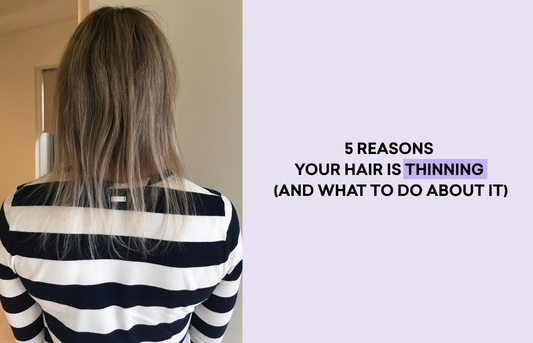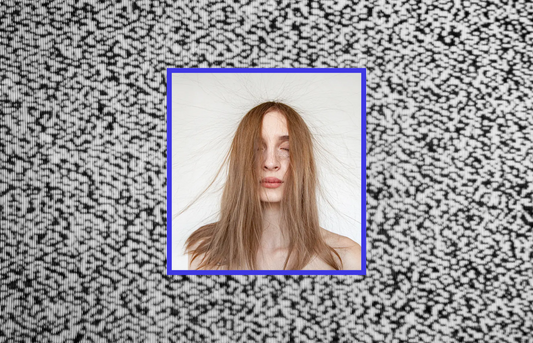Stress And Hair Loss: How To Grow Your Hair Back
Deep breaths.
In this article
Stress and hair loss are a common part of life but this doesn't mean you just have to let it happen and not do anything about it. If you've ever experienced hair loss due to stress, you know how frustrating it can be. You may have noticed that your hair is thinning, or that you're shedding more hair than usual.
I know how you feel. I've been there myself. I went through a very stressful period a few years ago, and my hair started to fall out. I was so worried about it, and I didn't know what to do.
So, I did some digging, and turns out there are actually things you can do to help your hair grow back. In this blog post, I'm gonna give you some tips on how to handle stress and make your hair grow like a champ. So, let's get into it!
READ: What Causes Thin Hair And How To Get Your Thick Locks Back
How Stress Can Cause Hair Loss
I didn't know about this when I was in university but I surely had a terrible hair shedding back then. I was working part-time in the wee hours of the night and then proceed to my class after work. After class, I would do some tutoring to some kids and that would usually take 1-2 hours before I'll finally be able to go home and take a nap. I say nap cause it only usually lasts 3-4 hours at best—then the cycle begins again.
I don't know how I survived that but one thing I remember was the shedding. I even stopped combing my hair back then and would just finger-comb it after applying a leave-in conditioner. After seeing that my hair was thinning, my mother advised that I take a year off and help out whenever I'm available in the family business.
So I did that, and about three months later, I got a few baby hairs on top of my head that I find quite bothersome. My hair began to thicken over time, and it was then that I realized how stress can lead to hair loss.
Stress is a powerful force that can wreak havoc on our bodies in various ways. One surprising effect that stress can have is on hair growth. When we find ourselves overwhelmed and anxious, our bodies release certain hormones that can disrupt the natural hair growth cycle, leading to hair loss.
READ NEXT: 8 Common Causes Of Hair Loss In Women
The Role of Hormones in Hair Loss
Hormones play a crucial role in regulating various bodily functions, and they can significantly impact hair health too. When stress takes hold, the body releases hormones like cortisol, commonly known as the stress hormone. High levels of cortisol in the bloodstream can interfere with the normal functioning of hair follicles.
ALSO READ: How Much Hair Loss Is Normal (No Need To Panic)
Unraveling Telogen Effluvium
Telogen effluvium is a form of hair loss that is often triggered by stress. It occurs when an unusually high number of hair follicles enter the telogen (resting) phase of the hair growth cycle prematurely. Under normal circumstances, hair follicles go through a growth phase (anagen), followed by a transitional phase (catagen), and finally, the resting phase (telogen) before shedding and regenerating.
However, when the body is under significant stress, this natural hair growth cycle can be disrupted. The increased levels of cortisol can push more hair follicles into the resting phase, resulting in noticeable hair shedding and thinning.
CHECK THIS OUT: 5 Secrets For How To Get Thicker Hair in A Month
The Link between Stress and Telogen Effluvium
Telogen effluvium is often triggered by intense stress or traumatic events, such as the loss of a job, the passing of a loved one, or a severe illness. These events can lead to physiological changes in the body that throw off the hair growth cycle.
One key factor is the impact of stress on the body's immune system. Prolonged or acute stress can weaken the immune system, leading to an inflammatory response that affects hair follicles. This inflammation can disrupt the hair's normal growth process and trigger excessive shedding.
READ: 10 Hair Loss Home Remedies To Solve Thinning Hair
Temporary Nature of Telogen Effluvium
The good news is that telogen effluvium is typically a temporary condition. Once the underlying stressor is addressed and managed effectively, the disrupted hair growth cycle can gradually return to normal. It's essential to be patient during this period, as it can take several months for significant improvements to become evident.
ALSO READ: 10 Scalp Health and Hair Growth Tips You Can Do at Home
Managing Stress-Related Hair Loss
Dealing with hair loss caused by stress can be challenging, but the good news is that it's reversible.
1. Embrace the Zen: Incorporating stress-reduction techniques into your daily routine can work wonders for your hair and mood. Activities like meditation, deep breathing exercises, yoga, or mindfulness practices can provide a sense of calm amidst life's chaos. Trust me, these simple practices can make your day-to-day life so much better.
2. Sweat Your Worries Away: Exercise isn't just fantastic for your body; it's a game-changer for your mind too. You don't need to be a fitness enthusiast; even a casual, easy run can do the trick. Physical activity releases those magical "feel-good" hormones called endorphins, which can counteract the negative effects of stress.
3. Nourish Your Hair from Within: While I admit that sticking to a balanced diet isn't always easy, it's worth the effort for your hair's sake. Load up on vitamins, minerals, and protein to support healthy hair growth. If you can't always get all the nutrients from your meals, consider adding supplements to bridge the gap. Nutrients like biotin, zinc, and iron are hair's best friends, so make sure they're part of your hair care routine.
4. Beauty Sleep for Your Hair: Making sure you get enough quality sleep each night is crucial. I know it's tempting to take on that exciting part-time job but trust me, your hair will thank you if you prioritize your beauty sleep. During sleep, the body repairs and rejuvenates, giving your hair the time it needs to grow and shine.
5. Share Your Burdens: Talking about your feelings and experiences can be incredibly therapeutic and relieve stress. Remember, you don't have to go through tough times alone. Whether it's friends, family, or a counselor, having a support system can make a world of difference for your emotional well-being and, consequently, your hair's health.
POPULAR: How to Make Thin Hair Look Thick
Say Bye-Bye to Stress and Hair Loss
Stress-related hair loss may be distressing, but it's a reversible condition that you have the power to manage. So stop letting stress control your hair and start controlling your life. Never underestimate the power of baby steps on your road to healthy hair development.
Love More Hair Care Tips? Read These Next:

Just high quality, beautifully designed halo hair extensions for natural, down to earth bombshells.
Shop now









